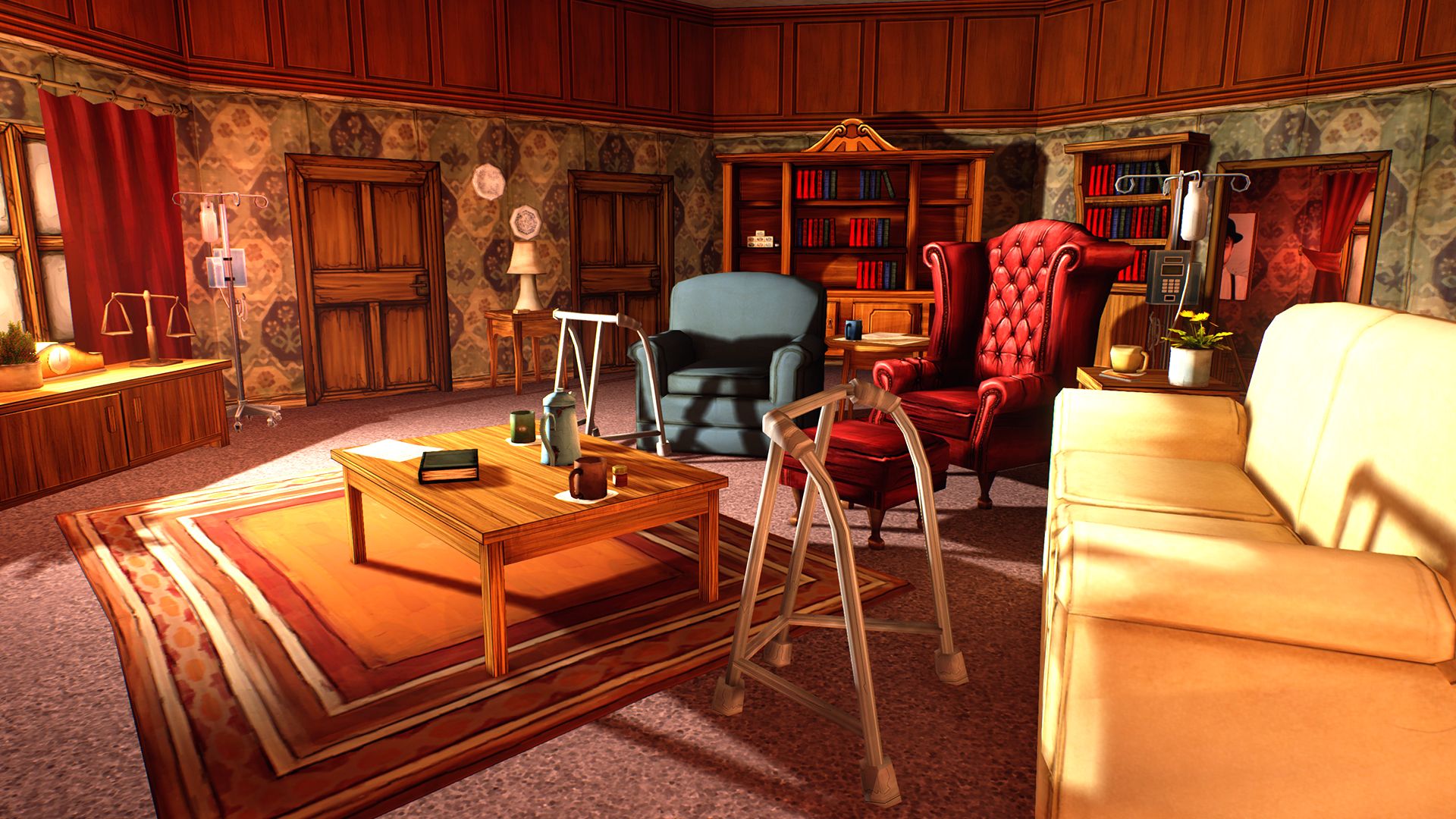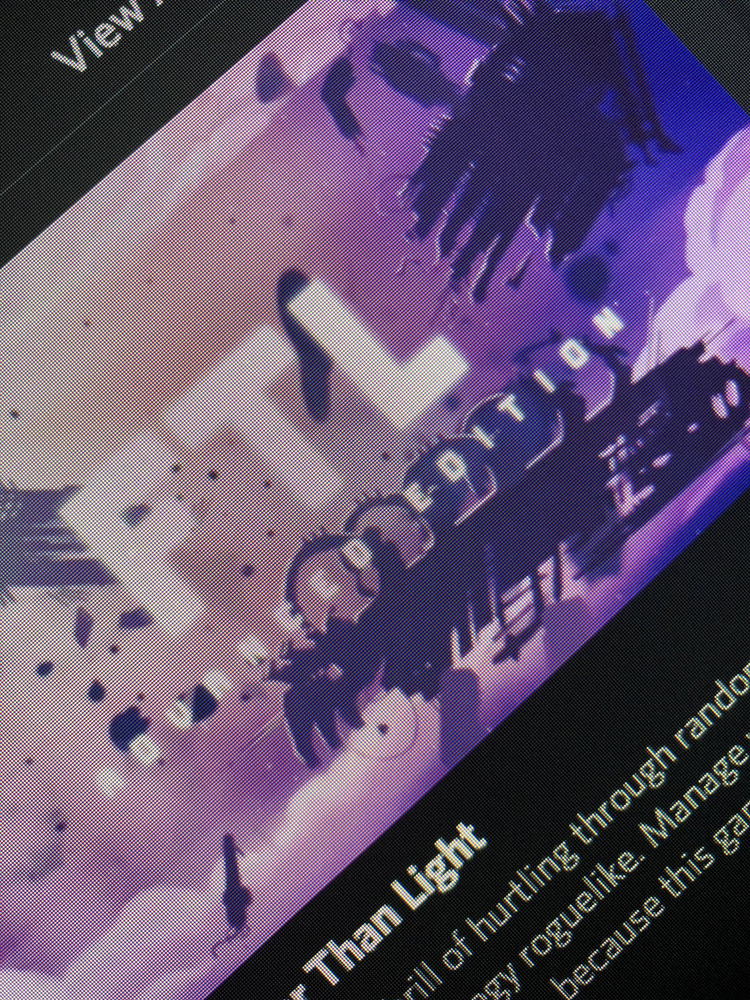Ether One - A story of two eras

This analysis contains spoilers
What is Ether One?
It's a first person adventure in which you play as Restorer, a psychic able to project himself into the mind of people with mental illness. A futuristic memory-retrieval company called the Ether Institute has tasked you with retrieving the lost memories of Jean Thompson, a 69-year-old woman diagnosed with dementia.
The Institute visualizes the damaged memories as 3D reconstructions, that you will have to explore in order to cure the disease. All the while, a mysterious woman called Phyllis will give you guidance (via voice-link) from within the Ether Institute.
From there, the game seems to follow a path that has become very familiar since the first Portal game: what is the real meaning of what you're doing? What are the true motives of Phillis and the Institute? Are you their employee or their prisoner?
The ending manages to pull a double twist without being contrived. Yes, it was all a fantasy: you aren't really a Restorer after all, and Phyllis isn't really you employer. That's because you have dementia and this sci-fi lucid dream was how you rebuilt your memories.
Stranger than fiction
Let's see the setting as the ending rewrites it.
The player is actually Thomas Fletcher, an elderly man with dementia living in a care home.
As we saw, the Ether Institute and the Restorer persona are the fantasy through which he is fighting to recover his memory, pieced together from the sci-fi movies he sees in the TV room, the people around him and his memories. More precisely:
The mysterious, scheming Phyllis from the institute is actually his doctor Phyllis Edmonds and the projectors you see in game are her audio notes for their validation therapy sessions.
Interestingly, the game puzzles that trigger these audio segments are often based on tasks like transcribing names and numbers that are commonly used in real validation therapy.
The unknown man we hear at the beginning of the game and then through anachronistic answering machines is Jim, Thomas' son, worried and unconvinced about the treatment.
The other voice we hear during the game is that of Jean, which is presented as the "patient" in the sci-fi setting but is actually a memory of his dead wife.
It also acts as a representation of Thomas' dementia, as many of her dialogues mention hallucinations (visual and olfactory) and incoherent thought pattern typical of that condition.
Finally, we have the Knocker stories, a series of optional collectibles that create a brief King-like novella about three kids and the accident that struck the mine.
The remaining 60% of the words of the game belong to notes and articles placed in the game world, like newspapers, letters and love notes.

One story, two eras
In other words, we have two different formats for two different timelines.Timed subtitles always apply to the present, while longer texts always narrate the past.
This is very interesting, because we can play with the strengths of each format in order to make that separation deeper and more effective.
Subtitles run in parallel with the English audio, so you must be careful not to restructure the sentences too much or the shifts in tone of the actor, which the foreign audience can still recognize, will happen at the wrong time.
Also, since some terms in the audio will still be recognizable, preserving them makes the translation feel more "trustworthy". Do you remember the Downfall meme? A bit like that, but with much less dark humor.
Instead, written texts leave no trace of the original. And since that pesky English isn't shadowing us at each step anymore, it's possible (and often recommended) to rearrange, expand, shorten, merge or even drop whole sentences in order to make the text sing.
Similarly, modern dialogues and pages of newspapers from the early XX century are clearly differentiated by the use of English loanwords.
Modern sci-fi and medical parlance are full of calques and loanwords, and most of our lines come from Phyllis who is precisely a sci-fi guide and a modern doctor! So, while keeping untranslated terms like Restorer or Core Memory will turn them into fantastic bits of techno-babble, using borderline calques like terapia di validazione (for validation therapy) and abnorme (for abnormal) will play nicely with its medical persona.
Written texts from the XX century, instead, would italianize everything. Your newspaper wouldn't write about May Day but about Calendimaggio, your fairy tale book wouldn't describe the Knocker but would find an equivalent like Battipietra and so on.
And so, this is how we will separate the two levels: modern characters that benefit from an English-influenced style will speak with subtitles that need to stay close to the original text, while the past will be beautifully framed with deeply adapted Italian texts.
Final touch on this (deliberate!) clash of styles: since we always work in team anyway, some worked only on the subtitles, while others only on the written texts, further enhancing the disparity.

Guess Who?
Over the course of the game we meet three main characters (Jean, Phyllis and Thomas/the player) and we discover their true identities only at the end.
While Jean pretty much vanishes once we know who she truly is, Phyllis and Thomas evolve significantly, and we had to take this into account in order to sustain that beautiful finale.
In order to characterize Phyllis, we decided to make her use the polite form lei throughout. This is a bit unusual for a videogame, but works very well with her scheming sci-fi persona and is just perfect for her doctor persona.
Throughout the story, she goes from being very cold and demanding, then stressed (from the managers above her) and finally emotional. But even at the very end, she calls herself doctor Edmonds, and her patient mister Thomas Fletcher.
Even as she holds back her tears, she makes the effort to remain professional. She's a good doctor, and a good Italian doctor caring the elderly uses the polite form.
As for Thomas, our avatar in the game, we had to play along with the mystery of his identity. Not only we never get to hear his voice until the very end of the story, but for a good part of it we have no clue of who we really are.
This is a concept pioneered by Dear Esther and then expanded upon by many other walking simulators. The first person camera, borrowed from traditional shooters, makes you feel at the heart of the action, but also makes it impossible to see yourself from the outside. Yes, it's really you playing, but who are you?
Dialogues play directly with this ambiguity: at the beginning Phyllis only calls us "Restorer" and it's only halfway through the game that we learn that we are a man called Thomas.
I think this ties brilliantly with the idea of the fantasy world gradually morphing into the real one as Thomas rebuilds his identity, and I can't imagine a better start than having him (and thus the player) without any identity.Are you a man, a woman, or even something else entirely? You literally don't know.
Normally, Italian inflections and conjugations would play against us, since you can't build a sentence without betraying the gender of the character at some point.But having chosen to leave the name Restorer in English a few paragraphs above comes to our rescue, since loanwords are invariable.With Restorer acting as a mask for most inflections and conjugations, it was only a matter of paying attention and add a few tweaks here and there and the secret was safe!

Goodbye Thomas, you will not be forgotten
A huge thanks to White Paper Games and Curri Barceló for getting us involved with Ether One, it's a project we remember with fondness.
Whenever game location is mentioned, the matter of fidelity is constantly raised, usually in binary terms: a translation is either 100% literal and faithful or 100% creative and transformative. For what it's worth, everything you read in this post falls under what we would call a faithful translation yet, as we saw, even tiny differences in how we translated certain texts and terms made it resonate in a very different way within their new language and culture.
After all, even the same melody can sound very different when you play it on a different instrument. It's been an honor playing for you, Thomas.




